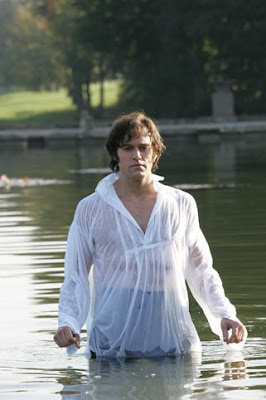This book blew up on 2012 lists of best books. You couldn’t
look on a 2012 book list without seeing Gone
Girl listed. A psychological
thriller, a missing wife, clues that keep piling up and keep you turning the
pages—what more could you ask for? (As it turns out, mixing all the best things
together can make a really bad thing, as Tracy Morgan figured out on 30 Rock by
trying to mix all great forms of music into one song, but I digress). It’s
called a dark thriller for a reason, you know.
The day of Nick and Amy’s wedding anniversary, Amy
disappears without a trace. As the police investigate, the clues seem to point
toward Nick as the cause for her disappearance, and maybe even murder. Though
it doesn’t look good for Nick because he’d been keeping things from the police,
he maintains his innocence. Things aren’t always as they appear….
This is a great theme of the book. The book is written from
alternating views of Nick and Amy, which really messes with your brain. If
there’s anything to be said, it’s that your view of a character can be
completely changed, chapter to chapter, depending on the point of view. This is
another interesting point; the same situation with the same facts and events
can be manipulated to manipulate the reader, and it gets even more complicated
when some facts are revealed and others withheld. The presentation is the thing.
Flynn’s strong suit in the book is presenting these
situations to you in order to get you to feel a certain way, but just when you
have a handle on the characters and have an idea of what really happened, she
rips the rug from under your feet and presents new facts, another point of
view. While some people complain that it’s not fair to the reader to play with
their emotions, I would like to remind them that this is a psychological
thriller, and that is the best part of suspense. Presenting everything all at
once wouldn’t be exciting, and this wouldn’t be a good suspenseful story.
I can’t promise that you will like any of the characters. I
have to remind myself time and again that it is not a necessary part of
literature (to have likeable characters), but it does help in certain books. In
The Yonahlossee Riding Camp for Girls, apart from atrocious decision-making and
a lack of morals (or any lesson-learning whatsoever), the main character is not
likeable at all. In that case, it wasn’t a good choice since empathy is a
necessary part of that coming-of-age tale. Gone Girl’s not necessarily likeable
characters improve the story and play up on the reader’s perception of the
story, what actually happened, who did it, and can completely change the ending
of the book.
| Boy, did this list creator get at least one thing right, am I right? |
I don’t want to ruin anything, and a lot of this novel
depends on not knowing, so I will end it here. It might be worth mentioning
that this book was “featured” on Orange is the New Black, the Netflix original
series. However, Piper Chapman, one of the main characters, clearly didn’t like
it as much as I did. Which means the writers didn’t like it very much. This is
odd, considering crime and drama are their specialties. They could at least
admit that, most opinions set aside, though you may have a full seat, all you
will need is the edge.
| Oh, and you're a great judge of character, aren't you? |
Rating: 8.75 out of 10 stars
You might want to check out
Gillian Flynn’s previous novels, if you liked her writing or suspense style,
Dark Places and Sharp Objects (Dark Places didn’t really appeal to me, but
Sharp Objects seemed interesting). You might also like The Shining Girls by
Lauren Beukes, though it is worth noting that that one is more about serial
killers and time travelling—it’s gripping and I have to give Ms. Beukes props
for such an interesting concept.



